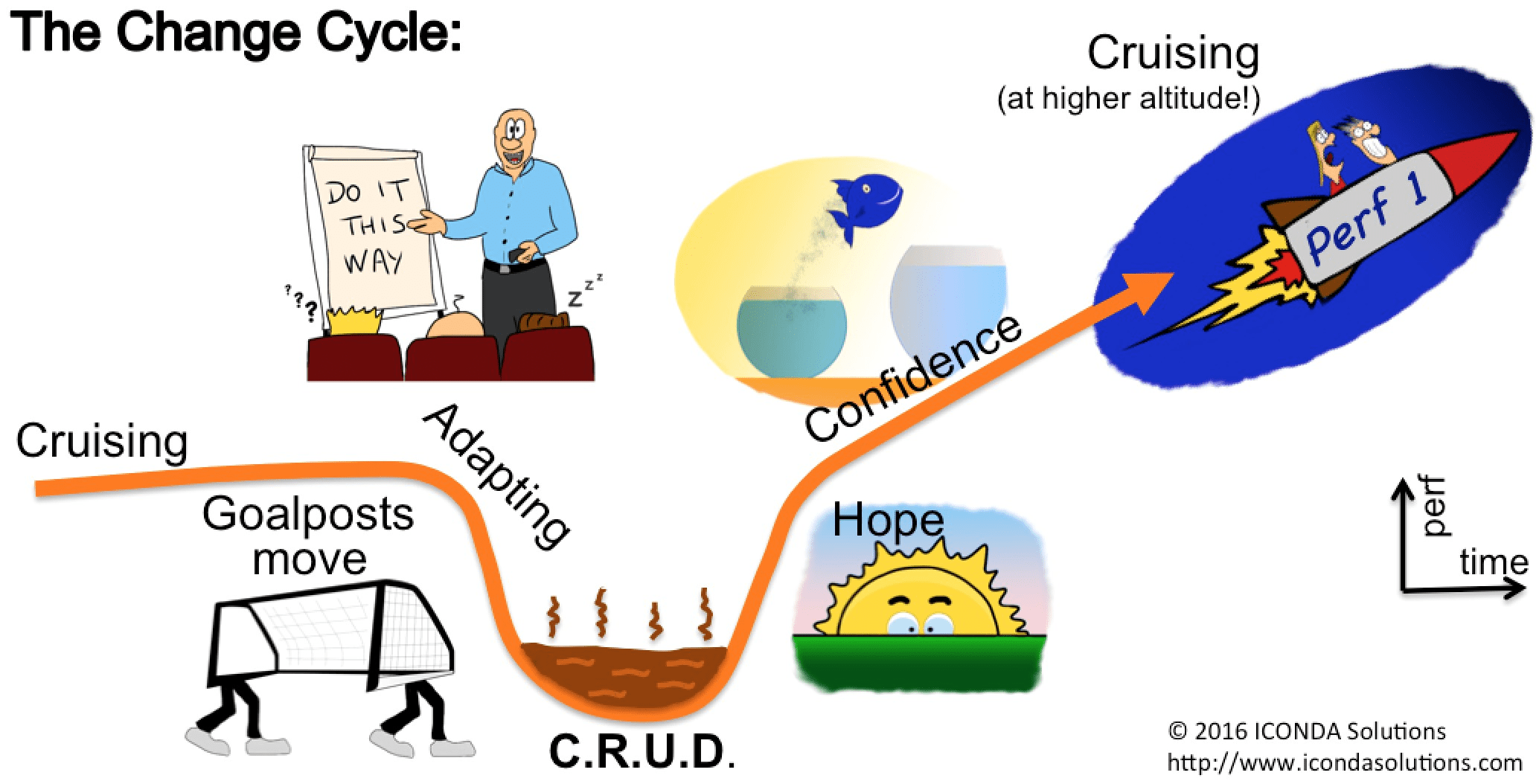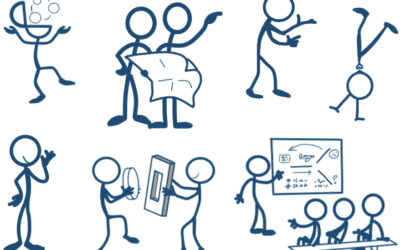Cynicism, Resistance, Uncertainty and Doubt (CRUD) are inevitable reactions to Learning Programmes set up to deal with performance challenges. Working out ways to avoid the CRUD is therefore essential to the success of such programmes, which are themselves critical to the success of organisations faced with change. This includes adjusting to markets and technology, meeting the challenges associated with growth or decline and coping with changes in key personnel. And so it concerns all businesses, most of the time.
To deal with CRUD, it helps to first get some perspective on it: to know where it comes from and how it fits into the change cycle 1.
Let’s start with an organization that is cruising along, regularly surpassing its objectives. Then the goalposts move. For example, their hardware gizmos start to get undercut by a software-only solution that runs on smartphones, and their market is disappearing fast. Management develops a new strategy involving (1) a transition to solutions with a larger software component, (2) a shift to the high-end B2B market. The first implies a requirement for new technical skills and the second more direct, commercial interaction between their engineers and their customers. They incite their organization to adapt, and introduce a Learning Programme to support the new strategy: training classes, e-learning, online information, and so on.
How do people react? There are four basic human emotions: fear, anger, sadness and joy (more sophisticated emotions can be understood in terms of these four basic ones) 2.
Those who get a kick out of dealing with new challenges can be put in the “joy” category, and don’t contribute to CRUD. But many people’s first reaction to change is fear (uncertainty and doubt) – they would prefer the security of the previous situation and try their best to cling onto it (resisting change).
Some people feel sadness and loss, and they too would prefer “the good old days”. Others will react angrily with “I told you so” (cynicism) and blame others, or even feel angry with themselves for “getting into this mess”. Hence, no matter what the qualities of the Learning Programme, there will be CRUD to deal with.
Although, there is not enough space in this article to deal with anti-CRUD methods in any detail, I would like to suggest one measure. Since learning is essential to successfully coping with change, and it’s very hard to learn in the presence of CRUD, it is crucial to incite people to do new stuff as early as possible, and to help them to learn through action.
It is a matter of common experience that doing things helps us to focus on the present and to avoid dwelling on the past. Further, the future can only be improved by taking action, and doing so favours the emergence of hope, then confidence. Assuming that the change strategy was well chosen, this eventually leads to new levels of performance.
Returning to the example, the company’s hardware engineers may be pleasantly surprised to find that the mysteries of different software paradigms are easy to understand once you start playing with them, and that their old skills are more reusable than they thought. Faced with the need to negotiate custom products for their new B2B customers, many of them may find the techno-commercial aspect of the business more interesting than they expected, making them realize how significant their contribution to business development could be …
The sequence described is indeed a cycle, since the goalposts will surely move again one day, taking us into another cycle.
At Iconda, we help high-tech companies, engineering organisations and even individual engineers with all sorts of performance challenges, very often associated with client communication and business development, and always in the context of, shall we say, stimulating market conditions. Anticipating and dealing with CRUD is therefore one of our favourite tasks ![]()
For related topics: ICONDA Blog. Related websites: ICONDA Solutions, ICON9.
1 Many authors have written about the change cycle, for example Dilts, Changing Belief Systems with NLP. Dilts’ 4 phases – conscious/unconscious competence/incompetence – can be recognised in the cycle as I present it, though Dilts does not talk about CRUD.
2 The first use of this list of four basic emotions may have been by Eric Berne, the founder of Transactional Analysis. However, the list is now so widely used that its origins have become obscure.




